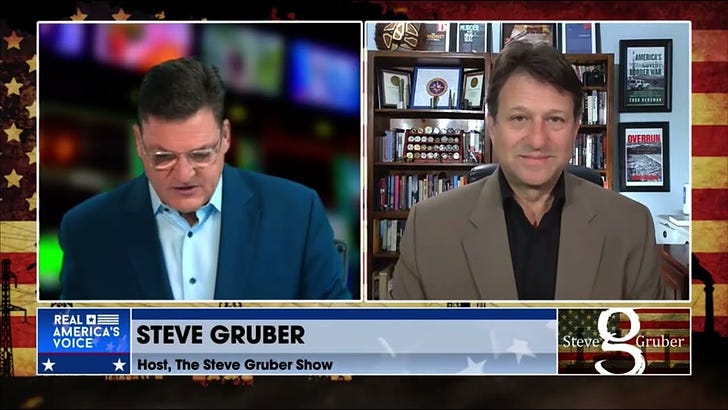Todd Bensman on the Border: Trump 2.0
Is President-elect Trump already having an impact on Biden’s border crisis?
On The Steve Gruber Show this week, border security and counterterrorism expert Todd Bensman previewed the Trump administration's first steps toward securing the nation.
Bensman said he believes President-elect Trump’s pick for “border czar,” Tom Homan, is the right man for the job of securing the border and deporting illegal aliens. Homan, who has a long and distinguished law enforcement career, served as acting director of the U.S. Immigration and Customs Enforcement (ICE) for 18 months during Trump’s first administration.
“I think Tom Homan is absolutely committed to the mission set, here,” Bensman told Gruber. “He’s going to be the eye of the hurricane, for sure. This is the premier, primary agenda item for the incoming Trump administration. It’s also going to be the most controversial.”
Bensman anticipates pushback from what he calls the “pro-open border, pro-illegal immigrant industrial complex,” as leftist migration advocacy groups are “already geared up and organized to do lawfare and propaganda, information war,” Bensman said. “So, this thing is going to get ugly, fast. No matter what he does.”
Bensman believes the deportation project is probably going to gear up “a little slower than people think. Because, remember, the Biden administration has totally dismantled the deportation and detention system. Piece by piece.”
In Chapter 10 of his book, Overrun: How Joe Biden Unleashed the Greatest Border Crisis in U.S. History, Bensman details how Biden’s Homeland Security secretary, Alejandro Mayorkas, did away with the U.S. deportation infrastructure and put in place Immigration and Customs Enforcement (ICE) policies that virtually put an end to deportation for all but the worst violent offenders and terrorists.
“There is no detention space, to speak of,” Bensman said. “Certainly none for family units, for example. They’ll have to declare an emergency to just be able to use military base facilities for that.”
Bensman said the incoming administration is considering using military aircraft for deportation.
“The first thing they’ll do is sew up the border with expulsion policies. They’ll rebuild the wall. And then do expulsion which is the opposite of what’s been for the last four years. Which is like a welcome wagon policy — everybody who shows up gets into the country. In this case, everybody who shows up is probably going to get detained, and-or expelled. Very small numbers actually being allowed in.”
Bensman addressed the ongoing debate in the security community about whether to declare the Mexican smuggling cartels Foreign Terrorist Organizations. “Remember, the system that we have to declare an FTO, at the State Department, it’s a six-step process.” Bensman said. “You have to be able to have an infrastructure to actually enforce when there’s an FTO designation. Most of that infrastructure is dedicated to Islamic terrorism right now. So they might have to take a minute and expand that. As well as scope down and define exactly what they mean.”
The reason is because the Mexican drug cartels are already deeply ensconced within the United States, with a significant presence in all fifty states.
“The Sinaloa cartel itself is not like Al Qaeda, or ISIS,” Bensman said. “It’s got 50,000 employees right here in the United States.”
Bensman said Mexico’s new president, Claudia Sheinbaum, borrowed her predecessor’s policy on the cartels, which is “abrazos no balazos” or “hugs not bullets.”
“And I’m not making that up,” Bensman said, “that’s what they use. Hugs not bullets. And we need them to take a bullets-not-hugs approach, right off the bat.”
Bensman believes the threat of trade tariffs is already having an impact on Sheinbaum’s policies on migration. The open flow of migrants is “already plummeting,” he said.
“There’s a principle at play, here. No migrant wants to drop ten thousand dollars if they know they’re going to get stuck in Mexico, or deported all the way to their home countries. They will stay in their home villages. That is, across the globe, a calculus that is absolutely true. You’re not spending the money, in large numbers, to cross the border unless you know you’re getting in and staying in.”
Bensman said migrants in Mexico are hearing the media reports that Trump’s border czar intends to “round everybody up” and deport. “I just came back from Mexico City, from all those camps, and interviewed all kinds of people down there, and lots of lots of them were telling me they’re going home,” while others may settle in Mexico for the next four years, he said.
Bensman attributes the migrants’ change in plans, and Mexico’s change in policy, directly to President-elect Trump’s public statements. “Trump, not even in office, said I’m putting 25 percent trade tariffs on all your products unless you use your military, right now, to shut ‘em down,” Bensman said. “So, already, you can see there’s this deterring effect happening. They call it the Trump effect, when he was first in office. It’s another Trump 2.0 effect happening now.”
Bensman believes the power of Trump’s messaging will ultimately depend on whether his administration follows through. “They’re going to be watching to see if people get in,” Bensman said. “And if they’re not getting in, they’re going to stay in place, or not even leave their home villages.”
Thanks for reading!
Subscribe for free and follow me on X: https://x.com/KimWexlerMAJD


